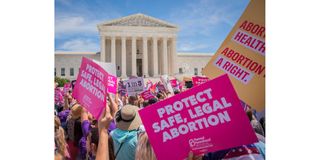Safe abortions will end silent tragedies, uphold human rights

Pro-life abortion protest on the steps of the US Supreme Court. Safe abortions 'will end silent tragedies and uphold human rights'.
What you need to know:
- An estimated 2,600 Kenyan women lose their lives each year to complications from unsafe abortions.
- Many women resort to desperate measures, seeking unsafe procedures performed by unskilled practitioners or attempting self-induced abortions.
Jael* was only 15 when she fell pregnant, and the news plunged her into a desperate situation. Driven by a mix of love and ignorance, her distressed mother turned to a herbalist in a misguided attempt to "solve" the problem.
But months later, complications struck with a vengeance. Jael was rushed to hospital, and the unthinkable happened—she lost her uterus.
The aftermath of this tragic event created an agonising chasm between mother and daughter, leaving Jael to grapple with an unfathomable loss that would haunt her for years to come.
The weight of Jael's story hung heavy in the air during a recent abortion rights workshop I attended.
Tragically, Jael's story echoes throughout the world daily. The World Health Organization estimates that six out of 10 of all unintended pregnancies worldwide end in an induced abortion. Around 45 per cent of all abortions are unsafe, of which 97 per cent take place in developing countries.
An estimated 2,600 Kenyan women lose their lives each year to complications from unsafe abortions. These deaths are entirely preventable. Many women, like Jael's mother, resort to desperate measures, seeking unsafe procedures performed by unskilled practitioners or attempting self-induced abortions.
Such dangerous methods lead to severe complications, infections and even death. This grim reality disproportionately affects marginalised communities that lack proper healthcare access and accurate information.
Jael's story became the catalyst for her sister's journey as an abortion rights activist. From humble beginnings in Kibera, Nairobi, she has rescued countless lives by enabling girls and women to obtain safe abortions.
The contentious abortion debate often spirals into religious and moral realms, but evidence surrounding us unequivocally supports the fact that banning abortions does not eradicate them.
Denying women and girls the right to choose only drives them towards perilous options, perpetuating an unyielding cycle of avoidable tragedies.
In Kenya, abortion remains heavily restricted as it’s only permitted under specific circumstances, such as when a trained health professional deems it necessary for emergency treatment, or when the life or health of the mother is at risk, as allowed by written law.
Acknowledging the reality
The right to safe abortions is not an endorsement or promotion of abortion as a method of family planning. Rather, it’s an acknowledgment of the reality that some women find themselves facing unwanted or unplanned pregnancies due to various circumstances.
In a world swirling with myths and misinformation about abortion, the need for comprehensive sex education becomes even more critical. It’s one of the surest ways to equip women and girls with the tools they need to navigate the complexities of reproductive health and abortion.
In an ideal and just world, women and girls would have full control over their bodies. Sadly, our patriarchal society ensures that they do not.
By divorcing morality from the abortion debate and recognising it as a public health and human rights issue, we can pave the way for change.
*Name changed to protect identity.
Miss Oneya comments on social and gender topics. Twitter @MissOneya; Gmail: [email protected]





